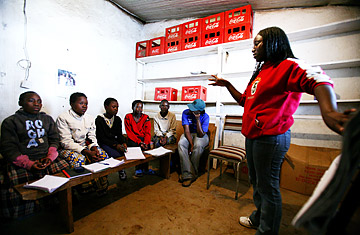
Sex-education and self-awareness classes are held for young women and girls in the sprawling Kibera slum in Nairobi
Any attempt to decrease the number of unwanted pregnancies and slow the spread of sexually transmitted diseases like HIV around the world has to be a good thing, right? That's what the U.N. Educational, Scientific and Cultural Organization (UNESCO) thought. But now it finds itself under fire from American conservatives for proposing a new set of guidelines on sex education in schools as a means of helping young people avoid potentially dangerous sexual activity.
The guidelines, which UNESCO is still preparing, recommend that national governments, education ministries and school systems around the world provide students with more sex education at an earlier age than what they usually get now. As they mature, students would get more detailed information about avoiding pregnancy and disease. The goal is simple: with contraception often not an option in many parts of the world — and vaccines to prevent diseases like AIDS still unavailable — UNESCO hopes that teaching children more about the risks of sexual activity will help them steer clear of such perils. The organization believes this could be one way to scale back the 111 million new cases of sexually transmitted diseases reported among people ages 10 to 24 globally each year and similarly reduce the 4.4 million abortions that are sought by women ages 15 to 19 annually.
But a handful of conservative U.S. news pundits have been denouncing the guidelines since late August, when they snapped up the online version of the UNESCO working document. The biggest issue for critics is the recommendation that educators begin teaching students introductory reproductive and sexual subjects earlier than usual: from the ages of 5 to 8. More detailed information would then be taught to kids ages 9 to 12. For kids ages 12 to 15, UNESCO recommends that students be instructed about contraception and the differences between "safe abortion and post-abortion care" and the potentially life-threatening forms of improvised pregnancy termination.
Given their hostility to abortion and their insistence that abstinence is the only legitimate way of avoiding pregnancy and sexually transmitted diseases, it isn't surprising that some American conservative and Evangelical groups have reacted angrily to the UNESCO document. "U.N. Report Advocates Teaching Masturbation to 5-Year-Olds" read the headline of FoxNews.com's Aug. 26 story. "New UNESCO Sex Education Guidelines Call on Children to Promote Abortions," a LifeNews.com article announced on Sept. 1, the same day conservative news site CNSNews.com warned that "U.S. Funds U.N. Group That Supports Teaching 5-to-8-Year Olds about Masturbation."
The obsession with onanism is a bit curious, given that the 102-page document mentions masturbation only five times: twice to explain to 5-to-8-year-olds what the term means, saying teachers should note that it's "not harmful, but should be done in private," and the other three times in a section referring to 9-to-15-year-olds, pointing out that these kids should be told it "does not cause physical or emotional harm" and is "often a person's first experience of sexual pleasure."
Yet that focus and the wider conservative reaction to the UNESCO document seem to reflect a similar strategy to the one employed to fight President Barack Obama's proposed health-care reform. First, critics have launched the debate before UNESCO has even finished its recommendations, which are based on analysis of 80 different studies of sex-education programs. Second, they have broadcast sensational accusations of the offending proposal's intent to better grab the attention of — and alarm — the public.
"This isn't about teaching 5-year-olds how to masturbate, but rather providing young people with better information about themselves and how they can avoid trouble and danger," says Sue Williams, chief of UNESCO's press-relations department in Paris. "We're not surprised by this reaction, nor the places it's coming from. In fact, our very goal with such recommendations is to initiate the kind of debate, reflection and action that moves the topic forward. Our desire now, however, is that the debate be both informed and balanced."
Apart from the outcry from American conservative groups, however, it appears the response to the recommendations elsewhere in the world has been mostly calm. Williams says the reaction and press coverage has largely been supportive, including in "conservative places like the Solomon Islands and Ethiopia, which have to balance traditional values with pressing problems created by unwanted pregnancy and disease."
So what happens now? Detractors will probably continue to hammer at the document even as it's readied for the Sex and Relationships Education Conference starting Sept. 7 in Birmingham, England. The guidelines will then be presented to the U.N. in New York City sometime in October, at which point governments and education officials can either act on or ignore them as they wish. There's a chance that, in the U.S., UNESCO's recommendations will be drowned out by the knee-jerk outrage of conservative pundits. But at least the guidelines can undergo sober and thoughtful examination in more open-minded places ... like Ethiopia.
